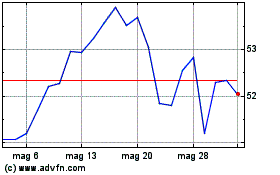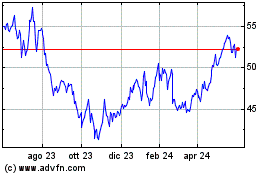BOE's Carney to Extend Term by One Year to June 2019
31 Ottobre 2016 - 7:50PM
Dow Jones News
LONDON—Bank of England Gov. Mark Carney is to serve an extra
year as head of the U.K. central bank to see the U.K. beyond its
exit from the European Union, the BOE said Monday.
Mr. Carney said in a letter to Treasury chief Philip Hammond
that he would be "honored" to serve as governor until June
2019.
Mr. Carney took the job in 2013 on the understanding he would
serve five years of the standard eight-year term for a BOE
governor. He opened the door to serving the full term—until
2021—late last year, but recent clashes with Brexit-supporting
lawmakers fueled speculation he might leave in mid-2018.
The decision raises the prospect he will stay through the
completion of negotiations to exit the European Union. Prime
Minister Theresa May has said she will formally trigger Article 50
of the Lisbon Treaty by the end of March, opening a two-year window
for negotiations.
"By taking my term in office beyond the expected period of the
Article 50 process, this should help contribute to securing an
orderly transition to the U.K.'s new relationship with Europe," he
said.
Speculation over his future had reached fever-pitch in the U.K.
He has faced criticism from some euroskeptics for what they
consider his scaremongering about the potential costs of leaving
the EU. But the central banker's supporters say his strong response
to the June referendum result avoided market panic that could have
endangered the world economy.
Mrs. May earlier affirmed her support for him to remain at the
job for a full-term, in a rebuke to the hard-liners who want him
out sooner.
"It is clearly a decision for him, but the PM would certainly be
supportive of him going on beyond his five years," Mrs. May's
spokeswoman said. "She recognizes the work that he has been doing
for the country and supports that."
Asked if the prime minister thought Mr. Carney was the best man
for the job, Mrs. May's spokeswoman said: "Absolutely."
The spokeswoman said Mrs. May has regular discussions with Mr.
Carney. Downing Street said the two spoke Monday in a meeting that
had been scheduled for some time.
Signs of possible tensions with Mrs. May surfaced after her
speech at the Conservatives' party conference in early October, in
which she criticized the BOE's easy-money policies. Treasury chief
Philip Hammond later clarified that the government had no plans to
change the BOE's inflation-fighting remit or dilute its cherished
independence.
Mr. Carney, a Canadian, had told British lawmakers last week
that he was still reflecting on his decision, which he called
"entirely personal" because of the potential disruption to his
family of serving a longer term.
Prior to the referendum, his spell in office garnered mixed
reviews. One lawmaker memorably described him as "an unreliable
boyfriend" following apparent pledges on interest rates that he
later backed away from. But he won plaudits for his efforts to
modernize the BOE and especially for his sure-footed response to
the Brexit vote.
Mr. Carney and his colleagues will decide whether they need to
ease policy further on Thursday, after cutting the benchmark
interest rate to a new low of 0.25% and reviving a crisis-era
bond-buying program in August to cushion the economy from a
potential Brexit shock.
Martin Sorrell, chief executive of WPP PLC, which owns such
advertising agencies as Ogilvy & Mather and Grey, said he hoped
Mr. Carney would stay. "He stabilized things at a very difficult
time," Mr. Sorrell said in an interview. "They were worried and
concerned, but they moved very quickly to deal with it."
Write to Jason Douglas at jason.douglas@wsj.com and Nicholas
Winning at nick.winning@wsj.com
(END) Dow Jones Newswires
October 31, 2016 14:35 ET (18:35 GMT)
Copyright (c) 2016 Dow Jones & Company, Inc.
Grafico Azioni WPP (NYSE:WPP)
Storico
Da Giu 2024 a Lug 2024

Grafico Azioni WPP (NYSE:WPP)
Storico
Da Lug 2023 a Lug 2024
